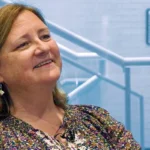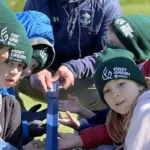by Sylvia Blair | Photography by Walter P. Calahan
Carroll Locals Pursue College Later in Life
In spite of the challenges that go along with pursuing a college degree later in life — the chaos that comes with raising children, running a household, working a job, and stacking courses, studying and homework on top of that — almost a third of undergraduate students are 25 or older in Maryland.
According to the Maryland Higher Education Commission, in the fall of 2016, undergraduate students age 25 and older accounted for 32.5 percent of the combined total of undergraduate students at community colleges, four-year public and state-aided independent institutions in Maryland.
New beginnings and a renewed sense of purpose are among the rewards of going to college later in life, and that purpose inspires students to juggle jobs and family responsibilities as they expand established careers, refresh skills or start off on a fresh path in their lives.
Lessons in Self-Discovery
Thirty-six-year-old Betty Gonzales was once a fine arts student in her hometown of San Antonio, Texas. Feeling like she wanted to explore more of the world outside the classroom, she withdrew and enlisted in the Navy. She was a Mandarin Chinese linguist for six years and was stationed in Hawaii for four years.
When she and her husband were expecting their son, she decided to be a stay-at-home mom, and she quickly adjusted to her new identity as a parent. They moved to Glen Burnie and then to Manchester, where her son started school.
Gonzales’ love for art resurfaced during time spent on arts and crafts activities with her son. And, in the back of her mind, she started to discover an inner desire to one day pursue a college degree in art.
Gonzales finally made the decision to go back to college after a separation from her husband. She enrolled at McDaniel College and continued to live in Carroll County with her son.
At McDaniel, she received veterans’ benefits to pay part of her tuition. She also received additional aid from the college. A part-time job after class also helped with costs.
The decision to go to college later in life required much thought across the span of a few years. Gonzales said she realized that it would take a significant mental and emotional push for her to take the leap to register. Life as a single mom, at the time, created uncertainties about how her decision would affect her personal life and time with her son.
“Ultimately, my experience resulted in greater self-confidence, enduring friendships and a stronger ability to handle competing priorities,” she said. “Time management struggles were well worth the personal and professional rewards.”
Gonzales graduated with a Bachelor of Arts degree in 2015. In 2018, she graduated with a Master of Fine Arts from the Maryland Institute College of Art. She now works as the communications and development coordinator at Arts Every Day in Baltimore.
A Life-Changing Experience
Leissa Rushing, 48, earned a medical assistant certificate at Carroll Community College after the company she worked for closed. As it turned out, earning the certificate changed her life. After graduation, she was able to find a job in her career field that gave her a sense of accomplishment and self-worth that she said felt exhilarating.
“When I attended high school, I found academics to be rather difficult. I was not sure I could succeed at college, like my friends and classmates were doing. I was surprised to learn that indeed I could do it — and with flying colors!” she said.
Fueled by the conviction that she could accomplish her goals, Rushing became adept at prioritizing her studies. She developed a new sense of confidence and confronted challenges like feeling nervous about deadlines and exams. She said she never felt alone, thanks to the help of instructors who supported her and classmates whom she met in study groups.
“When I talk to patients and co-workers at my new job, they give me such positive feedback. I feel that I am making an important contribution in the world. My life is meaningful. I am proud to say I have a career,” she said.
Rushing added that her employer assists with reimbursement for training and education. As a result, she aspires to apply to a nursing program one day.
Realizing a Passion
Kristina Jennings attends Carroll Community College. This fall, she will be pursuing a certificate in a new program, digital fabrication (program approval is pending).
The 31-year-old received her associate’s degree in graphic design from CCC in December 2017 while working as an emergency room radiology technician.
Jennings’ primary motive to go to college later in life was the desire to become an equal financial partner with her husband. Jennings’ pursuit of a degree was also an opportunity to prove to herself that she could achieve her goals. Better still, she defined and realized her life’s passion and is now credentialed in a subject she said she really loves — graphic design.
“It feels great to do a project for a client and receive positive feedback about my work. I have a clearer understanding of my life’s path going forward. I feel great about myself and my new skills.” said Jennings.
Support and Resources
Colleges are increasingly responding to the challenges faced by a population of “non-traditional.” Specialized services and programs make the degree path easier to navigate. For example, Carroll Community College offers career development resources and personalized financial aid services to all credit students, among other forms of assistance. A Carroll class titled “Ready to Return” helps individuals who have been away from the classroom for a number of years to become students once again.
Vice President of Continuing Education & Training at Carroll Community College, Karen Merkle said that as part of its student support programs, the school offers free monthly career choices discussions and they have a coordinator who is available to meet with students one-on-one to help individuals reach their goals.
“Our goal is for all students to be successful and achieve their goals. Many of the adult learners enrolling in continuing education workforce related courses and programs are returning, in some cases, after many years since any formal education,” Merkle said. “Some experience anxiety and doubts about their ability to succeed and are often enrolling in classes with diverse ages and backgrounds. Our faculty are particularly prepared to manage diversity of age and experience in the classroom and work to create a welcoming and supportive environment for all students.”
Karen Violanti, McDaniel’s associate dean for first-year students, oversees the college’s First Stop office. The First Stop team helps connect students to people, places and programs on campus.
“Designed for all new students, the First Stop office utilizes a holistic and integrated approach. Services are especially important for students who return to college after an absence, a military service, or who are seeking a career change,” said Violanti.
Getting a Degree Online
Online learning is a popular alternative for students seeking a degree. Flexibility and convenience are the hallmarks of online education.
Bob Ludwig, 55, is an assistant vice president at University of Maryland University College. When he decided to return to college to pursue another degree in fall of 2016, he learned firsthand about the perks and the challenges.
“One of the unique aspects of online learning is fitting it into a busy life,” said Ludwig. “I learned the value of flexibility to do assignments when I can, as I work to meet class deadlines,” he said.
Weeknight and weekend study sessions are common for him. Ludwig feels especially connected to his online classmates, who bring a wealth of expertise and insight into class discussions. Close professional relationships and business networking are some of his favorite parts of online learning.
Ludwig is working toward his Master of Science degree in environmental management. He wants to have a deeper understanding of the environment and the growing concerns about climate change. “Although this is still many years off in the distance, I hope to one day improve and protect the health of the Chesapeake Bay,” he said.
For Ludwig and other students who study later in life, applying lessons learned in pursuit of a college degree or certificate have paved the road to success in academics, and ultimately, in their lives.














